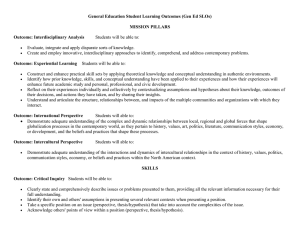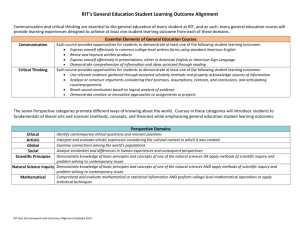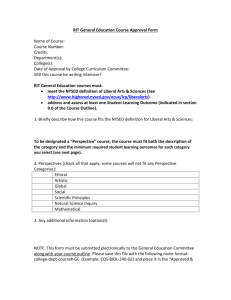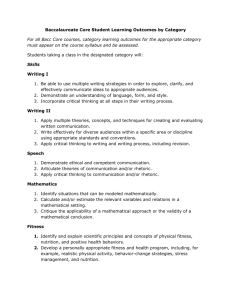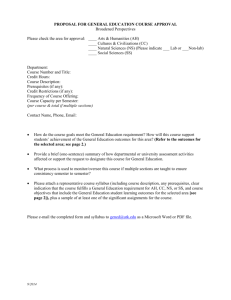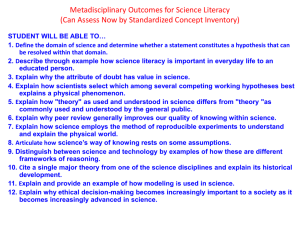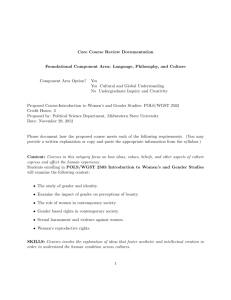Institutional Student Outcomes and General Education Goals
advertisement
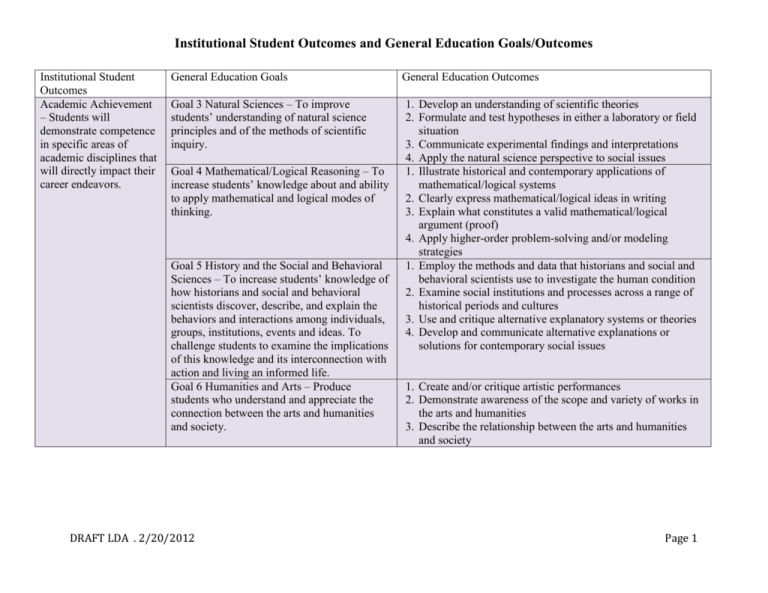
Institutional Student Outcomes and General Education Goals/Outcomes Institutional Student Outcomes Academic Achievement – Students will demonstrate competence in specific areas of academic disciplines that will directly impact their career endeavors. General Education Goals Goal 3 Natural Sciences – To improve students’ understanding of natural science principles and of the methods of scientific inquiry. Goal 4 Mathematical/Logical Reasoning – To increase students’ knowledge about and ability to apply mathematical and logical modes of thinking. Goal 5 History and the Social and Behavioral Sciences – To increase students’ knowledge of how historians and social and behavioral scientists discover, describe, and explain the behaviors and interactions among individuals, groups, institutions, events and ideas. To challenge students to examine the implications of this knowledge and its interconnection with action and living an informed life. Goal 6 Humanities and Arts – Produce students who understand and appreciate the connection between the arts and humanities and society. DRAFT LDA . 2/20/2012 General Education Outcomes 1. Develop an understanding of scientific theories 2. Formulate and test hypotheses in either a laboratory or field situation 3. Communicate experimental findings and interpretations 4. Apply the natural science perspective to social issues 1. Illustrate historical and contemporary applications of mathematical/logical systems 2. Clearly express mathematical/logical ideas in writing 3. Explain what constitutes a valid mathematical/logical argument (proof) 4. Apply higher-order problem-solving and/or modeling strategies 1. Employ the methods and data that historians and social and behavioral scientists use to investigate the human condition 2. Examine social institutions and processes across a range of historical periods and cultures 3. Use and critique alternative explanatory systems or theories 4. Develop and communicate alternative explanations or solutions for contemporary social issues 1. Create and/or critique artistic performances 2. Demonstrate awareness of the scope and variety of works in the arts and humanities 3. Describe the relationship between the arts and humanities and society Page 1 Institutional Student Outcomes and General Education Goals/Outcomes Civic Engagement – Students will demonstrate the awareness, knowledge, and skills to actively participate individually or collectively on issues of societal concern. Goal 9 Ethical and Civic Responsibility – To develop students’ abilities to identify, discuss and reflect upon ethical perspectives and use these perspectives to engage in civic responsibilities. Goal 10 People and the Environment – To increase students’ understanding of today’s complex environmental challenges. Students will examine the interrelatedness of human society and the natural environment. Knowledge of both bio-physical principles and psycho-social cultural systems is the foundation for integrative and critical thinking about environmental issues. Goal 11 Performance and Participation – To prepare students for responsible and effective participation in groups and communities. DRAFT LDA . 2/20/2012 1. Examine, articulate and apply their own ethical work 2. Apply core concepts (e.g. politics, rights and obligations, justice, liberty) to specific issues 3. Analyze and reflect upon the ethical dimensions of legal, social, and scientific issues 4. Recognize the diversity of political motivations and interests of others 5. Identify ways to exercise the rights and responsibilities of citizenship 1. Explain the basic structure and function of various natural ecosystems and of human adaptive strategies within those systems. 2. Discern and analyze patterns and interrelationships of the bio-physical and psycho-social cultural systems. 3. Critically discern and analyze individual, social, and ecological dimensions of health. 4. Describe the basic institutional arrangements (social, legal, political, economic, health, ethical, religious) that are evolving to deal with environmental and natural resource challenges. 5. Evaluate critically environmental and natural resource issues in light of understanding about interrelationships, ecosystems, and institutions. 6. Propose and assess alternative solutions to environmental problems, and then articulate and defend actions they would take on various environmental issues. 1. Participate effectively in a variety of artistic, educational, political, recreational, health and public service, or social service settings, or; 2. Interact with others of another culture in its indigenous setting through a structured experience, or; 3. Participate cooperatively in group athletic activity or artistic performance. Page 2 Institutional Student Outcomes and General Education Goals/Outcomes Communication – Students will demonstrate the ability to effectively communicate verbally, in writing, and through digital and/or visual media. Critical Thinking – Students will demonstrate the ability to analyze situations and problems in order to identify and test solutions. Global Citizenship – Students will demonstrate an awareness and knowledge of international cultures and societies. Goal 1 Communication – Produce students who are able to communicate effectively in oral and written forms. 1. Prepare and present effective public oral communication 2. Create effective college-level written communication 3. Write effectively in content-area courses Goal 12 First Year Experience – To promote further development of student success skills, such as reading, writing, and speaking; help students gain intellectual confidence; build in the expectation of academic success; and to provide assistance in making the transition to the University. Goal 8 Global Perspective – To increase student understanding of the growing interdependence of nations, traditions and peoples and develop their ability to apply a comparative perspective to cross-cultural social, economic, and political experiences. 1. Experience higher personal expectation of his/her ability to meaningfully participate in academic life. 2. Define and give examples of critical thinking. 3. Interact with other students regarding academic matters. 4. Affirm that careful thinking is an important aspect of the educational process. 5. Make a comfortable transition to college life. 1. Describe, analyze and evaluate social and cultural phenomena which influence the contemporary and historical relations among nations and peoples. 2. Demonstrate knowledge of social and cultural differences. 3. Analyze specific international problems and the social and/or cultural differences which influence their solution. 4. Understand the role and responsibility of a world citizen. DRAFT LDA . 2/20/2012 Page 3 Institutional Student Outcomes and General Education Goals/Outcomes Multicultural/Diversity – Students will demonstrate an awareness and knowledge of social, cultural and personal values of others. Goal 7 Human Diversity – To increase students’ understanding of individual and group differences, of the contributions of pluralism to United States society and culture, and of the historical and contemporary responses of the United States to group differences. 1. Understand the development of an the changing meanings of group identities in the United States’ history and culture. 2. Demonstrate an awareness of the individual and institution dynamics of unequal power relations between groups in contemporary society. 3. Analyze and evaluate their own attitudes, behaviors, concepts, and beliefs regarding diversity, racism, and bigotry. 4. Describe and discuss the experience and contributions of the many groups that shape American society and culture, in particular those groups which have suffered discrimination and exclusion. 5. Demonstrate communication skills necessary for living and working effectively in a society with great population diversity. Self-Directed Learning – Students will demonstrate the ability to autonomously acquire knowledge and develop skills. DRAFT LDA . 2/20/2012 Page 4
